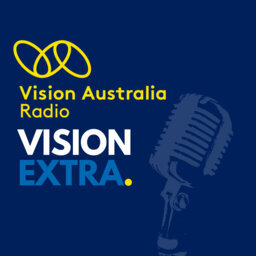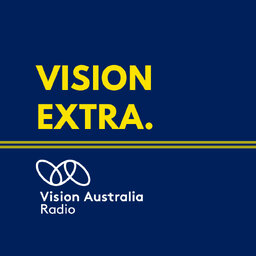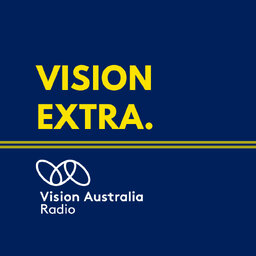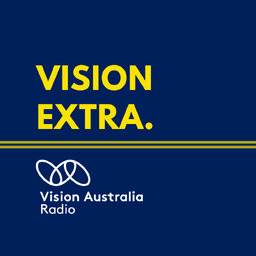This is a special presentation of the interview featured on 25th September edition of Focal Point.
Haben Girma, Deafblind Advocate Extraordinaire, is a guest speaker at UNSW
Centre of Ideas. Haben is the first Deafblind Harvard Graduate;
has been named one of the Forbes 30 Under 30 and was awarded the White
House Champion of Change - presented by President
Barack Obama.
This version of the interview features the full gap between Peter asking his questions and Haben answering. We made the creative decision to put a small gap in the on-air and podcast versions played on Focal Point. You can find that version of the interview here: https://omny.fm/shows/focal-point/25-sep-2024
I have a typist here transcribing what you're saying on a standard Qwerty keyboard, and then the words are popping up in braille, on the braille display in front of me, and I'm reading the words. There is, of course, a bit of a delay between when you speak and when the typing comes through. And then there's that pause. As an editor, you get to choose. Do you remove the pause to make this conversation sound more hearing? Or do you keep in the pause to make the conversation sound more authentic? Those are artistic choices, and if there isn't a right or wrong choice.
On Vision Australia Radio, this is Vision Xtra with Peter Greco.
I'm delighted to welcome to Australia and to this program, leading Deafblind Advocate from the US. Haben Girma haben, welcome and thank you so much for your time.
Oh, it's an honor to be here. Before I even set foot in Australia, I was reading all about blind advocates throughout the country who were advocating for disability leadership, which is something we care about in the United States, too. So it's fantastic to actually be in Australia. And during my time here, I was able to meet with some of the blind leaders.
Haben, you're here at the University of New South Wales. What were you doing there?
I gave a keynote at the University of New South Wales in Sydney with NAS Campanella, and we had a great conversation about Accessibility. Travel, and the similarities and differences between disability advocacy in Australia and disability advocacy in the United States and both communities right now really care about having leadership in disability related organizations that reflects the people they're serving. So we're all advocating for more disability leadership.
What are some of the differences between, say, Australia and the US in this area?
Here in Australia, there's the NDIS, which you know all about, but many Americans are still learning about. So it's been fascinating to learn about the work here.
Do you think it's a good system from what you've learned?
I'm still learning about it, and it's hard for me to comment on that given there's so much. I still don't know about NDIS, but I sense a lot of enthusiasm and people wanting it to be stronger so that everyone who needs support receives support.
Let's talk a little bit more about leadership. It's important that people with disabilities fill leadership roles.
Yes I agree. So for example, in the United States, there's a deaf blind training center called Helen Keller National Center, and they're over 50 years of history. They have never had a deaf blind Executive director. So a lot of deaf blind people are campaigning. Deaf blind people and allies sighted hearing. Allies campaigning for there to be deaf blind leadership at an organization that is working to increase employment, education and other opportunities for deaf blind people. And I know there is similar concerns and dreams in Australia that disability organisations have disability representation.
That's a novel idea. Having people with disabilities, leading organisations representing people with disabilities who would have thought anything like that?
I'm sensing sarcasm. Or at least I hope that sarcasm. It's very, very familiar because we have the National Federation of the blind and the American Council of the blind. Both of those organizations have been blind led from the start. So I am used to having blindness organizations with blind presidents, CEOs, executive directors, and there are other disability organizations for different disability experiences that also have disability leadership. But there should be more. We should have more disabled leaders within disability organizations.
I've been your sarcasm. Radar is working well. Congratulations on that. Tell us about your encounter with President Obama.
That is a great memory. you? So we met at the celebration of the 25th anniversary of the Americans with Disabilities Act. And as you know, I'm deaf, blind, and I could not hear President Obama. And we told him that I'm deaf, blind and access information best through Braille. He normally communicates by voice, but he graciously switched from voicing to typing so I could read his words. So he typed on a keyboard. I read on a Braille display what he said, and I responded back by voice. People need to know that all of us can make small changes that have a huge impact. Blind people can also change and make our world more accommodating for folks who use wheelchairs, folks who are deaf, folks with other disabilities. It also intersects with our blind identities because there are many blind people who use wheelchairs or have other additional disabilities. So that moment with President Obama was kind of a reminder to everyone that all of us have the ability to adjust, adapt, and make the world more accessible.
Was that part of the Champion of Change movement?
You know, it's kind of related to that. It was different, but there were many white House champion of change. Uh, there were many white House champions of change who were at that event.
And I guess a good place to start. Change is right at the top with an American president. That's a good starting point.
You know what? One of the things that surprised me when I first arrived in Australia is how many Australians know what's happening in American politics. A lot of people are following what's going on. And that was surprising and fascinating.
I've heard a rumor you've got an event coming up in November that might be important.
That rumor is correct.
Okay. Thank you for that.
How about you went to Harvard University? Tell us about that experience.
I wrote a book called Haben The Deafblind Woman Who Conquered Harvard Law. And the story behind the title and the book is that a lot of people were surprised that I went to Harvard University, and a lot of the reactions were, wow, you overcame your disability to go to Harvard? No, I'm still disabled. It was Harvard that had to overcome years of ableism and sexism. Helen Keller really wanted to go to Harvard, but back then they said no, only men. The school changed and finally recognized that women are brilliant and blind and deaf. Blind women are also brilliant. So this school has come a long way since Helen's time, but they still have more work to do, and all of us still have more work to do to make our organizations more accessible. I read recently that Vision Australia has agreed to open up recruitment for the CEO position to people outside of the organisation, and that is so exciting to learn that blind advocates were heard. After all the campaigning and petitions, their message was heard and for an organisation to have the grace to listen and open up, to change, that takes courage. And it's also teaching other organisations around the world that they can change. So I'm hopeful we're going to start to have even more disability leadership throughout Australia, the United States and around the world.
How were you accepted by other students at Harvard? You talked about, I guess, the management or the the people that were running the university. What about fellow students? What was that experience like?
So at the university, the students were a bit older than college students, a bit older than high school students. So many of them were at a point where they were no longer obsessing over feeling cool and appearances, and they were ready for authentic, meaningful connections. So I found it much easier to make friends and connect with students at law school than I did back in high school.
I call that subliminal No subliminal advocacy happened where you're living your life and your advocacy message is getting across to people in a sense, without them realizing it's happening.
I think we're all doing this. The advocacy of blind Australians is being heard in the United States and around the world. I want to remind blind Australians keep advocating people are listening and the work you're doing is serving as an example for other blind leaders around the world.
Obviously, living the life you do, you need to be an advocate. What about in your early days? Who were some of the people, or what were some of the things that set you on this path to being such a powerful, articulate, effective advocate?
I was able to spend time at disability organizations like camps for blind students or cross disability organizations where I could meet with advocates who use wheelchairs. Advocates with different disabilities and the opportunity to come together, share struggles. Solutions helped shaped me and helped shape me as an advocate.
Any one in particular you've touched on Helen Keller? I know you didn't meet her because you're way too young for that.
I met her through her words. She has left her own Words and experiences in her book. I found her difficult at first because I only knew of her through other people's stories of her, which unfortunately had a lot of disability bias. There was a lot of messaging of stop complaining. Helen Keller would never complain, and she was used as a kind of tool to silence advocacy. And that was really frustrating. And so at first I was annoyed with her. But then later when I started reading her work, I realised, wow, she's fantastic. She's done a lot and she's engaged with a lot of the struggles that we're engaging with today.
History teaches a lot. Does it happen often? At the time, we probably don't realise the impact people are making. It's only when we reflect on it that we kind of appreciate it.
Yes. And it's critical. We know our disability history. Our schools often don't cover this. So it's important that radio and disability organizations help people learn and remember our disability history.
Haben, we've talked about President Obama, we've talked about Harvard, we've talked about being a champion for change. What about being on the Forbes list? That's pretty cool, isn't it?
I agree, it is pretty cool.
Tell us more about that.
So Forbes recognized my advocacy for the disability community. I appeared in their Law and policy section. So I worked at a law firm fighting disability based discrimination, using the power of the Americans with Disabilities Act and other civil rights laws. I hope we'll have more blind people go into the field of law. It would be great to have more blind Australian attorneys working in disability advocacy.
What about in politics? We've got a few people with disabilities in politics here in Australia. Uh, I'm not sure what the situation is in the US. Do you think getting into politics can be a way of being a champion of change as well?
Absolutely. We need leadership in all fields politics, law, Teaching science, especially computers and tech, because that's shaping almost every industry. And if we had more blind scientists and AI researchers, they could help remove the disability bias that keeps getting baked into our tech.
We've talked about Australia and the US. Have you had much dealing with people in Europe or indeed in Asia? And perhaps, um, the situation there for people with disabilities and their advocacy?
I've traveled many different places and every place has their strengths and challenges. Singapore has an amazing metro system. Every station has wheelchair accessibility. Every station has tactile markings on the ground for blind accessibility. Some blind people like having those tactile markers. Others don't care. The more accessibility we have in our built environment, the more people will feel supported. It's good to have choices. Choices to use the tactile marker on the ground, to use a cane, a guide dog, human guide. We should all have those choices.
Things like that are a bit of visual advocacy, aren't they? Often you get browline in lifts or elevators. You might call them in the US.
So I feel like the vast majority of elevators have tactile markings, whether that's Braille or raised letters and numbers that you can feel. The challenge is that more and more elevators and lifts are switching to touch screens. And as a deaf blind person, that disempowers me because I can't use the touch screen and I can't hear the audio feedback, some of them have an accessibility feature that's just audio, which I can't use. So elevators lifts used to be a symbol of freedom for me. I can enter and exit at any floor I chose, but now I need to wait for sighted or hearing assistance in order to use the lift. And that's not right. They should be designing lifts for everyone, including deaf blind people.
I say this tongue in cheek. Maybe elevators should lift their game.
That is a very good pun.
Carbon. Would you like to explain to our listeners how we're doing this interview? We're doing it over zoom. You're a person who's deaf, blind. I'm speaking to you asking questions. We can hear your wonderfully articulate answers. What's happening between the two of us? Between me asking you a question and you giving your wonderful response.
When you're speaking, I have a typist here transcribing what you're saying on a standard credit keyboard. And then the words are popping up in braille, the braille display in front of me, and I'm reading the words. There is, of course, a bit of a delay between when you speak and when the typing comes through. And then there's that pause. As an editor, you get to choose. Do you remove the pause to make this conversation sound more hearing? Or do you keep in the pause to make the conversation sound more authentic? Those are artistic choices, and it's there isn't a right or wrong choice, but we come up with these artistic and accessibility questions as we do the work, and how we navigate through them is really fascinating.
I think perhaps for radio itself, we might edit out the pauses. If we do a podcast, I think we might leave them in so people can kind of get a bit of a bit of a better appreciation of how this has worked.
I have heard different things from people. Sometimes people say pauses. Give us time to reflect and really process what's being said. And other times people say pauses make us worry. Oh, no, the show is over. What happened? Why it.
Happened. What's been the best thing about Australia?
The best thing about Australia. Australians. They're very friendly and I've had lots of amazing conversations and interactions. We had fun getting a tactile tour of the Sydney Opera House. The tactile model with Braille all around it. So I could finally feel what that iconic building looks like. And then we walked up towards the roof and felt the tiles on the shells on the roof.
A lot of Australians haven't done that.
Wow. Well, maybe this radio program or podcast to help and encourage and invite more people to go check it out.
Uh, I.
Like your style. Very, very good indeed.
I really enjoyed this conversation. Peter. Thank you for.
Inviting me to your program.
Well, next time you get to Australia, we'd love to talk to you again and catch up with all the wonderful things that you've been doing. You have such an amazing CV. I'm very, very privileged to have been able to speak to you. I've got to thank a couple of people that have put us in touch with you. The very lovely Giselle, who I've known for many, many years, and also Teresa for her fantastic work to arrange this. It's been an absolute delight and a real privilege. I'm sure many people would have got plenty out of this, so thank you for speaking to us.
You're very welcome. Bye, everyone.
That's Haben Girma. They're blind, deaf, blind advocate from the US with that rich, rich CV of achievements and great of Harbin to have joined us.
Thank you for listening to Vision Xtra with Peter Greco. You can find this interview on the Focal Point podcast. This show was produced in the Adelaide studios of Vision Australia Radio.
 Vision Extra by Vision Australia Radio
Vision Extra by Vision Australia Radio


